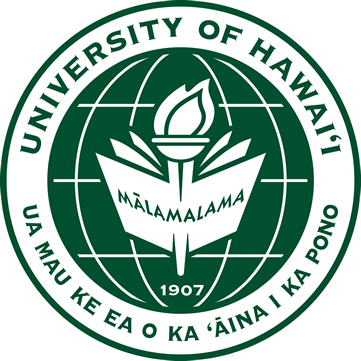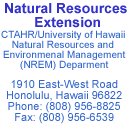


|
|
||||||||||||||||||||||||||||||||
|
|
||||||||||||||||||||||||||||||||
 Hawaii is a member of the Southwest States and Pacific Islands Water Quality Coordination Team |
||||||||||||||||||||||||||||||||
| Project Name: | The Integration of Aquaculture with Taro Production in Hawaii: A Commercial Demonstration of Pollution Abatement, Soil and Water Conservation, Controlled Eutrophication and Waste Recovery |
| ASO Log No.: | 96-405 |
| Start/End Date: | January 1996 to November 1998 |
| Federal Funds: | $83,875.00 |
| Matching Funds: | $56,750.00 |
| Contractor: | Ramon de la Pena University of Hawaii – CTAHR Department of Land and Natural Resources 3060 Eiwa St., Room 306 Lihue, HI 96766 Phone: (808) 241-3400 |
| Background/ Overview: |
Agriculture has been documented as the nation’s largest contributor of nonpoint source pollution, where the primary pollutants are nutrients, sediment, animal wastes, salts, and pesticides. Nutrient rich effluents, silt sedimentation, and dissolved solids are commonly discharged as nonpoint source pollutants from commercial taro farms and from intensive aquaculture systems into receiving waters in Hawaii. Similarly, most aquaculture crops in Hawaii today are grown as monoculture crops in intensive cultivation systems where large biomass is produced in a relatively small volume of water, resulting in high concentration of effluents discharged into receiving waters where significant negative impacts to water quality can occur. |
| Objectives/Goals: | To demonstrate that the integration of aquaculture with taro production systems can significantly reduce nonpoint source pollution caused by agricultural discharges of dissolved chemical fertilizers, high nutrient content aquaculture effluents, sediment, total dissolved solids, and pesticides. |
| Methods Employed: | Study the ability of both wetland taro and dryland taro to recover waste nutrients and suspended solids from aquaculture effluent discharged from intensive aquaculture tanks. Also to study the ability of the polyculture pond to recover/recycle waste nutrients, and trap silt and total dissolved solids which are discharged from two taro fields. |
| Pollutants of Concern: | Sediment, nutrients, pesticides |
| Watershed: | Nawiliwili, in Niumalu, island of Kauai |
| Size of Project: | on a farm adjacent to Puali Stream |
| Affected Water Bodies: | Puali Stream and Nawiliwili Bay |
| Deliverables: | Not described in report |
EPA Section 319 Success Stories, Vol III hi-lites Integration of Aquaculture with Taro Production: Nonpoint Source Pollutants Reduced in Demonstration Project
